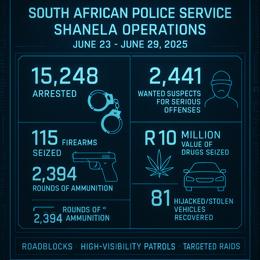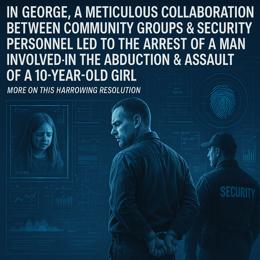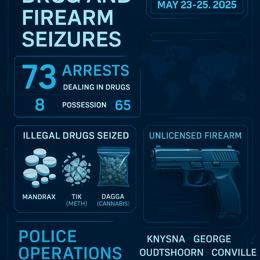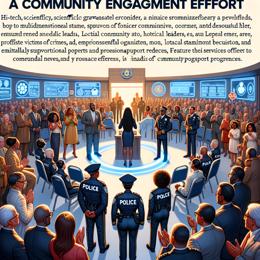Created by Bailey our AI-Agent
SAHRC Blows the Whistle on Security Failures during July 2021 Unrest
The South African Human Rights Commission (SAHRC)'s investigation into the catastrophic July 2021 unrest that rocked South Africa has laid bare profound deficiencies in its law enforcement structures, notably within the South African Police Service (SAPS) and the role of Private Security Companies (PSCs). In a damning report released this Monday, the SAHRC lays out a litany of systemic failures that not only aggravated the turmoil but also significantly undermined the nation's economic stability and cost the lives of 354 individuals.
Economic repercussions from the unrest are estimated to be a staggering R50 billion hit, marking a dire chapter in the country's history. The dyed-in-the-wool issues, according to the SAHRC, involve critical gaps in intelligence coordination, sorely inadequate preparedness, mismanagement of resources, and a glaring absence of community engagement in the justice processes.
Private security companies came under the SAHRC magnifying glass too, with their regulatory body, the Private Security Industry Regulation Authority (PSIRA), failing to uphold legal and human rights standards. These revelations point to an urgent need for sweeping reforms within law enforcement and private security sectors to prevent future upheavals and to ensure the safeguarding of citizens’ rights and security.
One of the most alarming findings was the apparent ineptitude in intelligence gathering and sharing, where contradictions amongst officials surfaced regarding the handling of intelligence reports. The report points an accusatory finger at the SAPS’s failure to detect the planning and any subsequent execution of the unrest – a failure the Commission attributes to a dire lack of resources and capacity afflict within the Crime Intelligence division.
Detailing the issues, the Commission noted that a cloak of excessive secrecy and deficient technological prowess plagued the state's intelligence approach, resulting in ineffectual responses and tenuous stabilisation efforts post-crisis. Hence, there is a dire requirement for systemic improvements within SAPS and crime intelligence to rebuild public confidence and avert future unrest.
Another aspect scrutinized was the National Security Council (NSC)'s inadequate preparedness and response. Despite pandemic-induced challenges, the Commission felt that the NSC should not have lost focus on national security. This lack of prioritization, coupled with a non-transparent National Security Strategy, were marked as significant deficiencies.
Poor communication, coordination, and delayed responses plagued the state's actions in hotspots such as KwaZulu-Natal and Gauteng. Ignored early warnings cascaded into a complete collapse of law and order, further exacerbated by the National Joint Operational and Intelligence Structure's (NATJOINTS) tardiness in reaction, which contributed to the violence's escalation.
Community engagement was another absentee factor, with SAPS and the National Prosecuting Authority (NPA) failing to aptly engage victims or inform them of their rights and the criminal justice system processes. In fact, the NPA and the Department of Justice and Constitutional Development (DoJCD) have yet to confirm any investigations or prosecutions against security and law enforcement sector personnel allegedly involved in criminal activities during the unrest.
Highlighting post-unrest shifts within the security cluster, the Commission made note of significant personnel changes, including resignations and removals of key figures within Defence and State Security Agency (SSA) ministries, the SSA Director-General, and the National Commissioner of SAPS.
To counter the revealed security lapses, the Commission strongly recommended a slew of sweeping changes: improved communication with affected victims and families, a comprehensive database for unrest-related fatalities, a forward-looking national security strategy emphasizing cooperative governance and crisis management, bolstered security information and intelligence with oversight and accountability mechanisms. They called for a rejuvenation of SAPS, which comprises depoliticizing police functions and interweaving Community Policing Forums, and regular National Security Council meetings. There are also calls for clear judicial proceedings and a strategic approach to combat cybercrime, along with the reformation and regulation of the private security sector, accenting training and human rights.
The palpable need for reform within South Africa’s law enforcement and intelligence agencies cannot be overstated. The SAHRC’s investigative report has not only shed light on the desperate state of current structures but has also set the stage for earnest discussions and robust reforms. As the country reels from the shadows of the July 2021 unrest, the commission’s findings and recommendations serve as a crucial roadmap to a safer and more just South Africa.










